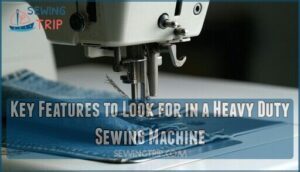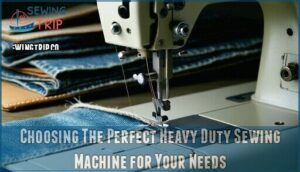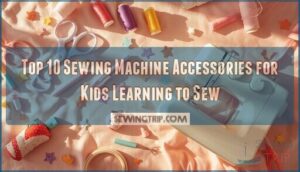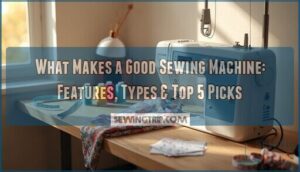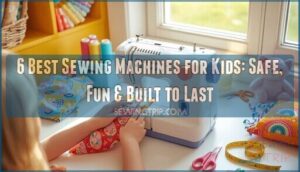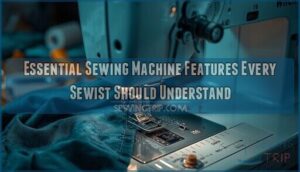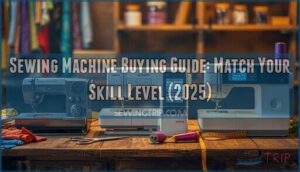This site is supported by our readers. We may earn a commission, at no cost to you, if you purchase through links.
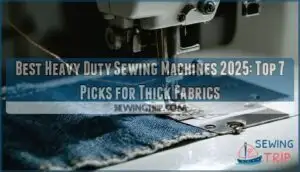
The best heavy duty sewing machines pack powerful motors and metal frames that handle multiple fabric layers without skipping stitches. Look for models with adjustable presser foot pressure and strong feed systems that grip tough materials securely.
Top picks include the Singer Heavy Duty 4423 for speed and the Brother ST371HD for versatility. These workhorses feature reinforced components that outlast plastic alternatives.
Your regular machine might throw in the towel on canvas or upholstery fabric, but heavy duty models power through like champions. Choosing the right features can make or break your next challenging project.
Table Of Contents
- Key Takeaways
- Importance of Durability and Strength in Heavy Duty Sewing Machines
- Key Features to Look for in a Heavy Duty Sewing Machine
- Top Heavy Duty Sewing Machines for Thick and Bulky Fabrics
- Specialized Features for Versatile Sewing Projects
- Choosing The Perfect Heavy Duty Sewing Machine for Your Needs
- Frequently Asked Questions (FAQs)
- Conclusion
Key Takeaways
- You’ll need a machine with a powerful motor and metal frame to handle thick fabrics like denim and leather without skipping stitches or stalling mid-project.
- Look for adjustable presser foot pressure and strong feed systems that’ll grip tough materials securely and guide multiple fabric layers smoothly through the machine.
- Top performers like the Singer Heavy Duty 4423 and Brother ST371HD offer the speed and versatility you need, with reinforced components that outlast plastic alternatives.
- Consider your specific project requirements and skill level when choosing – match the machine’s strength to your material demands and think about future creative projects you’ll tackle.
Importance of Durability and Strength in Heavy Duty Sewing Machines
When you’re working with tough fabrics, you need a sewing machine that won’t quit on you.
A heavy-duty sewing machine with a metal frame and solid component quality is key.
The motor power should be strong enough to handle thick seams and multiple layers without stalling.
Longevity matters, too—look for machines built for extended use with heavyduty materials that won’t wear out quickly.
Adjustable presser feet and fine-tuned thread tension help you manage fabric handling with ease, so there’s no skipping stitches or snagging.
Whether it’s denim, leather, or canvas, a durable, strong sewing machine is your best ally.
With the right machine, you’ll handle every project like a pro, no matter how thick or tricky the materials are.
Some models offer varied stitch options, making them versatile for different projects.
Key Features to Look for in a Heavy Duty Sewing Machine
When choosing a heavy-duty sewing machine, focus on strength and performance.
A strong sewing machine should handle thick fabrics like denim or leather while delivering precise stitches.
Look for models with powerful motors to prevent stalling on tough materials and maintain a steady stitch speed.
A metal frame adds durability, letting your machine endure heavy use for years.
Adjustable feet are perfect for handling multiple fabric layers or odd textures, while proper needle compatibility prevents breakage during heavy fabric sewing.
Strong thread tension keeps seams tight and clean on thick materials. High-speed stitching boosts productivity.
Here’s a quick checklist for must-have features:
- Motor Power: Guarantee smooth sewing on bulky fabrics.
- Metal Frame: Sturdy structure for longevity.
- Needle Compatibility: Handles heavy threads without snapping.
- Adjustable Feet: Adapts to fabric thickness effortlessly.
- Stitch Speed: Ensures quick, efficient sewing.
Top Heavy Duty Sewing Machines for Thick and Bulky Fabrics
Tackling thick fabrics like denim and leather? A heavy-duty sewing machine is your best bet! These machines boast incredible motor power, high-quality stitch quality, and durable needle systems to handle heavy fabric sewing effortlessly.
When tough fabrics meet their match, a heavy-duty machine turns challenging projects into effortless masterpieces.
With feed mechanisms and walking foot attachments, they glide seamlessly through tough materials. Brands like Singer and Juki deliver reliable industrial sewing machines built for demanding projects.
For superior performance, consider machines with adjustable presser foot capabilities.
| Brand | Features | Best For |
|---|---|---|
| Singer 4411 | Powerful motor, metal frame | Thick fabric sewing |
| Janome HD3000 | 18 stitches, automatic needle threader | Home projects |
| Juki DDL-8700 | 5500 stitches per minute, industrial | Professional work |
| Brother ST150HDH | 70 stitches, jam-resistant bobbin | Versatility |
| Juki TL-2010Q | High speed, large extension table | Quilting and big projects |
Specialized Features for Versatile Sewing Projects
Equipped with specialized features, a heavy duty sewing machine makes handling thick materials a breeze.
It powers through denim, leather, and layered fabrics effortlessly, giving you precision and control.
Here’s what you’ll love:
- Adjustable Presser Feet: Perfect for switching between delicate and bulky fabrics.
- Built-in Needle Threader: Saves time and frustration when starting projects.
- Extension Tables: Adds space for quilting or large items like curtains.
With versatile stitch options and strong motor power, even walking foot sewing machines glide smoothly.
For consistent results, some machines offer memory functions to save custom settings.
These features guarantee reliability and adaptability, no matter the project’s size or complexity.
Choosing The Perfect Heavy Duty Sewing Machine for Your Needs
Choosing the best sewing machine for thick materials means thinking about your unique needs.
It’s not one-size-fits-all, so let your projects guide you. Are you tackling leather or multiple fabric layers? A strong motor is non-negotiable. Got space constraints? Compact heavy duty sewing machines are worth a look.
Balancing cost with features is key, too. Higher-end models might save you headaches, but it’s okay to stick to your budget allocation.
Here’s your sewing machine buying guide:
- Project Requirements: Match the machine’s strength to your material demands, like denim or canvas.
- Skill Level: Beginners typically do well with easy-to-use heavy duty sewing machines.
- Future Projects: Think long-term—today’s best sewing machine should adapt to tomorrow’s creative ambitions.
For demanding projects, consider machines with enhanced needle penetration.
Frequently Asked Questions (FAQs)
What is the most reliable brand of sewing machine?
Looking for a brand that’ll stand the test of time?
Janome consistently delivers rock-solid reliability with their HD series, while Singer’s 4400 line offers dependable performance that won’t break the bank or your patience.
What is the difference between Singer heavy-duty sewing machine 4432 and 4452?
You’ll find the 4452 stitches faster at 1,100 SPM versus the 4432’s 850 SPM. The 4452 offers 32 built-in stitches compared to 4432’s Both share identical heavy-duty construction and reliability.
Are heavy-duty sewing machines better?
Heavy-duty machines outperform standard models when you’re tackling thick fabrics like denim or leather.
They’re built tougher, stitch faster, and handle multiple layers without breaking a sweat—perfect for serious projects.
Which is better, Brother or Janome sewing machine?
Brother and Janome both excel in heavy-duty sewing, but you’ll find key differences.
Janome offers superior build quality with metal construction, while Brother provides more computerized features at budget-friendly prices for versatile projects.
How do I maintain and clean a heavy duty sewing machine?
An ounce of prevention’s worth a pound of cure.
Clean lint from your bobbin area weekly, oil moving parts monthly per manual instructions, and replace needles after ten hours of use.
How much should I budget for maintenance costs?
Budget around $50-100 annually for maintenance costs.
You’ll need replacement needles every 8-10 hours, occasional oiling supplies, and periodic professional servicing.
Quality machines require minimal upkeep, making them cost-effective long-term investments.
Whats the average lifespan of these machines?
You can expect your machine to last 10-20 years with proper care.
High-quality models often run for decades, while budget options typically serve you well for about a decade of regular use.
Do I need special training to operate them?
Operating a heavy-duty sewing machine isn’t rocket science!
You’ll master the basics quickly with your manual and some practice.
These machines work like standard models but handle tougher fabrics with more power and stability.
Are replacement parts easily available and affordable?
Replacement parts for heavy-duty sewing machines are generally easy to find and reasonably priced.
Major brands like Singer, Janome, and Brother offer excellent parts availability through dealers, online retailers, and service centers nationwide.
Conclusion
Investing in the best heavy duty sewing machines will revolutionize your crafting game forever.
These powerhouse machines tackle thick fabrics, leather, and multiple layers with ease. You’ll save time and frustration while creating professional-quality projects.
Consider your specific needs, budget, and workspace before choosing. Whether you’re hemming jeans or crafting upholstery, the right heavy duty machine becomes your reliable partner.
Don’t settle for struggling with inadequate equipment when these workhorses deliver consistent results every time.

